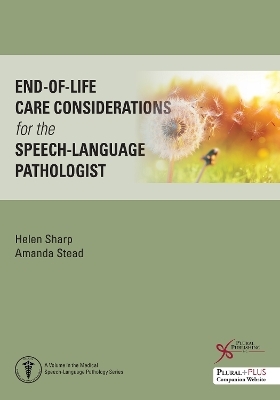
End-of-Life Care Considerations for the Speech-Language Pathologist
Plural Publishing Inc (Verlag)
978-1-63550-640-2 (ISBN)
The crucial role of speech-language pathologists (SLPs) in hospice and palliative settings receives a long-overdue focus in End-of-Life Care Considerations for the Speech-Language Pathologist, the fifth volume in Plural's Medical Speech-Language Pathology book series. Seasoned clinicians provide a practical guide to the terminology, context, and knowledge needed to employ best practices and address the specific needs of patients nearing the end of life. As a profession, speech-language pathology focuses primarily on rehabilitation, with the expectation that patients' function will improve with intervention. For patients with life-limiting conditions, SLPs play an important role in supporting patients' communication, cognition, eating, drinking, and swallowing with an emphasis on quality of living. Clinical professionals require tailored resources to develop their knowledge and skills related to appropriate care and treatment in hospice and palliative care contexts, which have been hard to find until now.
Nearly all patients experience difficulties with communication and eating as they near the end of life. Patients, family members, and professionals benefit if the patient can communicate their symptoms, indicate the effectiveness of symptom management strategies, participate in setting care goals, and engage in social-emotional and spiritual conversations with family and members of the care team. This book provides SLP professionals guidance in how to offer meaningful assessments and interventions that meet patients' needs. The book contains case examples together with the latest research and contributing clinicians' years of experience. Supported by these effective and thoughtful strategies, SLPs can offer both comfort and care for patients in their final days.
Key Features
An overview of and introduction to the key concepts and benefits of hospice and palliative care
Guidance on terminology and standard models of end-of-life care
Adult and pediatric case studies with frequently encountered scenarios
Chapters authored by a renowned team of contributors
Discussion of legal and ethical considerations
Practical techniques and strategies for assessment and intervention
Helen Sharp, PhD, CCC-SLP, serves as Research Facilitator in the Interdisciplinary Research Lab in Ethics, Palliative, and End-of-Life Care at the University of British Columbia. Her interest in the role of speech-language pathologists in resolving ethical issues in practice led her to pursue training as a Clinical Fellow at the MacLean Center for Clinical Medical Ethics, University of Chicago. Dr. Sharp has taught bioethics across disciplines including speech-language pathology, audiology, medicine, nursing, and dentistry. She is Director and Professor Emeritus of the School of Communication Sciences and Disorders at Pacific University and previously served as a speech-language pathologist at Loma Linda University Medical Center and as faculty at Western Michigan University and the University of Iowa. **** Amanda Stead, PhD, CCC-SLP, CHSE, is a Professor and the Coordinator of Simulation Education in the School of Communication Sciences and Disorders at Pacific University. Her research examines the pedagogy that best prepares future clinicians for work with geriatric patients and the development of high-quality health care simulations. In addition to teaching a course in progressive illness and dementia, Dr. Stead teaches courses in geriatrics, counseling, and aphasia, as well as coursework in end-of-life care across allied health professional students at Pacific University. She has trained thousands of SLPs through continuing education events in best practices related to serving patients near the end of life. She has received honors for excellence in teaching from the Oregon Speech-Language and Hearing Association (2013), Pacific University (2019), and the American Speech-Language and Hearing Association (2022).
Series Introduction
Foreword
Preface
Contributors
Chapter 1. Introduction to End-of-Life Care for the SLP
Joseph W. Shega, Rami Tarabay, Riwa Al Aridi, and Julieta Gilson
Chapter 2. The Roles and Responsibilities of Speech-Language Pathologists in End-of-Life Care
Amanda Stead, Helen Sharp, and Robin Pollens
Chapter 3. The Role of Patient Preferences in End-of-Life Care
Helen Sharp
Chapter 4. Communication and Cognition Management for Adults With Life-Limiting Conditions
Amanda Stead and Michelle Bourgeois
Chapter 5. Supporting Eating, Drinking, and Swallowing for Adults With Life-Limiting Conditions
Paula Leslie and Marnie Kershner
Chapter 6. Speech, Language, and Communication Services for Children With Life-Limiting Conditions
John Costello and Rachel Santiago
Appendix A. Resources to Support Teaching About Death, Dying, and End-of-Life Care
Amanda Stead and Jordan Tinsley
Appendix B. End-of-Life Decisional Support Aids for Individuals With Communication or Cognitive Impairments
Michelle Bourgeois and Amanda Stead
Appendix C. Supplemental Reading and Resources
Helen Sharp
Index
| Erscheinungsdatum | 23.01.2024 |
|---|---|
| Verlagsort | San Diego |
| Sprache | englisch |
| Maße | 178 x 254 mm |
| Themenwelt | Medizin / Pharmazie ► Gesundheitsfachberufe ► Logopädie |
| ISBN-10 | 1-63550-640-9 / 1635506409 |
| ISBN-13 | 978-1-63550-640-2 / 9781635506402 |
| Zustand | Neuware |
| Haben Sie eine Frage zum Produkt? |
aus dem Bereich


